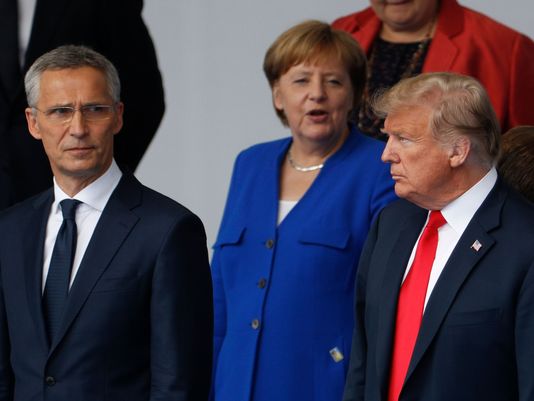Special to WorldTribune.com
UNITED NATIONS — Donald Trump’s rhetorical thunderclap at the start of the NATO Summit sent political reverberations throughout allied capitals and put the pundits into overdrive as to what immeasurable damage the American president had caused while in Brussels.
Indeed while chiding European allies on their woeful shortfalls on agreed defense spending and singling out Germany for its dangerous dependence on Russian energy supplies, the president single-handedly sent the annual Atlantic Alliance meeting into a tailspin.
But there was a point to the Donald’s bombast.

Despite commitments to the contrary by NATO’s 29 member states to two percent of GNP Military spending minimum, only five (Estonia, Greece, Poland, UK, USA) are holding to the agreement. American spending still covers over 70 percent of the Alliance’s costs, while Germany stands at 1.2 percent, Italy at 1.1 and France 1.8, shouldering far below their capacity.
Diplomacy is not just a transactional ledger sheet but nuanced and balanced reflections and moves to affect a favorable outcome. In this Donald Trump, a former New York real estate mogul, misses the mark. Yet President Trump’s tone droned out his vital message; most NATO members are paying less than they had agreed to and much of Europe, especially Germany, was increasingly dependent on Russian energy supplies.
First a little history.
After the end of WWII in 1945, brute Soviet expansionism in Eastern Europe and Josef Stalin’s attempt to strangle Berlin during the blockade in 1948 galvanized the postwar world and brought about the birth of the North Atlantic Treaty Organization (NATO) in 1949. The Alliance started with 12 core members including the United States. From its position of wartime victory and economic strength, the U.S. was able to rewrite the rule book for the post war era.
NATO’s core principal became peace through Europe’s collective security, largely provided by the USA. In the post-war era this made sense as Europe was rebuilding from a devastating conflict. But by the 1970’s the fulcrum had tipped as a more prosperous Europe largely chose a free ride from the Americans.
Equitable burden sharing had always confronted NATO states; as Germany’s official Defense White paper stated in 1979, “The United States has every right to except the European parties to the Alliance to make reasonable contributions for fair burden sharing.” While Jimmy Carter failed to press the issue with allies, Ronald Reagan certainly did.
After winning the Cold War many on the Left wanted to seriously downsize NATO reflecting the Peace Dividend. Thus NATO redefined itself to remain relevant and in the process expanded its membership to the Baltic states and Central Europe and became entwined in a number of out of area operations such as Afghanistan.
Nonetheless NATO’s deterrence and defense supported a strong, safe and prosperous Europe. Today no serious person could question Europe’s capacity to pay a larger sum for its own defense.
Largely overlooked and forgotten too was Europe’s growing reliance on Russian energy. The pipeline politics issue dominated the transatlantic policy in the Carter and early Reagan
Administrations. Reagan’s pushback to Germany over the Soviet pipeline construction earned him smirks, consternation and distain from the all knowing Euroclass.
Gazprom has shadowed Europe’s energy independence for quite some time. As I wrote in my book Transatlantic Divide, The USA/Euroland Rift, “The EU’s energy dependence gives Moscow enormous geopolitical clout which can act as a tool for political influence.” Now with the Nordstream II pipeline operational, there’s even a bigger natural gas flow to industrial Germany.
Want to talk about a covert and sustained Soviet political influence and disinformation campaign? Recall the “peace movement” of the 1980’s where Moscow’s unsettling manipulation measures served as the backdrop to opposing Reagan era defense efforts.
Conservatives and moderate Democrats were regarded as “shrill anti-communists.” Back then the clarion call was; “Why can’t we talk to the Russians?”
Now ironically when President Trump talks to a fundamentally different Russia its called collusion. Hypothetically had Hillary Clinton followed a NATO Summit with such a meeting, many media pundits would call it a brilliant and bold diplomatic stroke.
Following the summit, NATO Secretary General Jens Stoltenberg stated succinctly, “After years of decline, when Allies were cutting billions, now they are adding billions … In fact, since President Trump took office, European Allies and Canada have added an additional $41 billion dollars to their defense spending.”
Enhancing the national pride and interests of our NATO partners should be America’s means to getting them to back higher defense spending and unity. Diplomatic decorum, not bluster, will gain their support.
John J. Metzler is a United Nations correspondent covering diplomatic and defense issues. He is the author of Divided Dynamism the Diplomacy of Separated Nations: Germany, Korea, China (2014). [See pre-2011 Archives]

 By
By